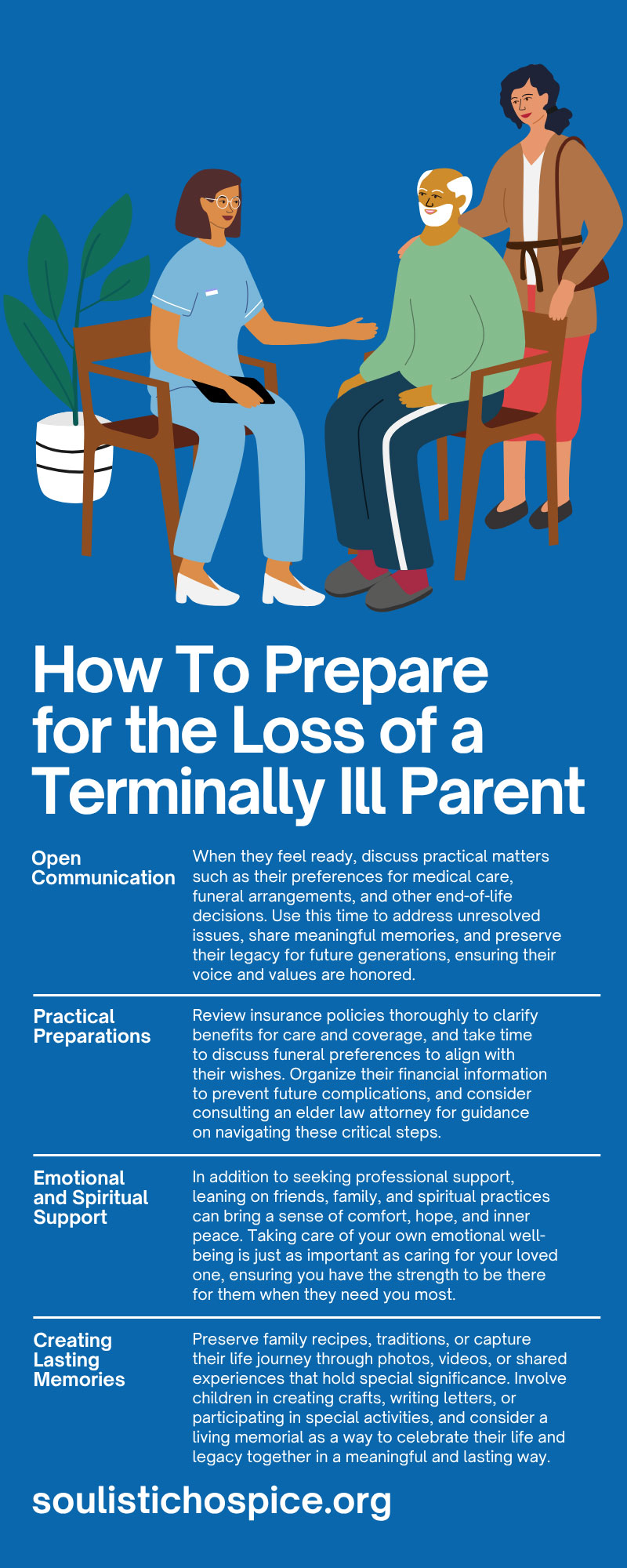
Facing a parent's terminal illness brings a whirlwind of emotions, but preparation can turn an overwhelming experience into one of connection and peace. Taking thoughtful steps now allows for healing conversations, cherished memories, and honoring your parent's wishes.
This guide offers emotional, practical, and spiritual support, helping you learn how to prepare for the loss of a terminally ill parent. Remember, you’re not alone—support is available from healthcare professionals and counselors to guide you through.
Understanding the Stages of Grief
Grief doesn’t follow a set timeline, and everyone’s experience is unique. Elisabeth Kübler-Ross identified five stages of grief—denial, anger, bargaining, depression, and acceptance—but you might skip stages, revisit them, or feel them all at once. These emotions are natural and help you process the intense pain of loss in your own way. Some may experience anticipatory grief, mourning a loss before it happens, while others hold onto hope until the end. Both responses are valid and reflect the love you have for your parent.
The five stages of grief include:
- Denial: A protective response that shields you from overwhelming reality.
- Anger: Intense emotions, often directed at others or yourself, often masking deeper feelings of fear.
- Bargaining: Attempts to regain control or hope, such as making promises or seeking alternative solutions.
- Depression: Deep sadness and withdrawal, a natural response to impending or actual loss.
- Acceptance: A peaceful understanding of the situation, focusing on remaining time and the future.
Grieving is deeply personal, so allow yourself to experience these emotions without judgment as part of your healing process.
Open Communication
Honest conversations during a terminal illness can bring healing, connection, and clarity while respecting your parent's wishes. Begin by asking gentle questions about their fears, hopes, and dreams to create a safe space for open dialogue.
When they feel ready, discuss practical matters such as their preferences for medical care, funeral arrangements, and other end-of-life decisions. Use this time to address unresolved issues, share meaningful memories, and preserve their legacy for future generations, ensuring their voice and values are honored.
Practical Preparations
Legal and financial preparations are essential for honoring your parent's wishes while reducing stress for the family. Start by establishing key documents such as a will, financial power of attorney, and an advance healthcare directive to outline their preferences and ensure proper decision-making.
Review insurance policies thoroughly to clarify benefits for care and coverage, and take time to discuss funeral preferences to align with their wishes. Organize their financial information to prevent future complications, and consider consulting an elder law attorney for guidance on navigating these critical steps.
Emotional and Spiritual Support
Caring for a terminally ill parent can be an emotionally overwhelming experience that requires a strong support system. Professional counselors, support groups, and hospice services can offer valuable coping strategies, emotional guidance, and practical assistance to help navigate this difficult time.
In addition to seeking professional support, leaning on friends, family, and spiritual practices can bring a sense of comfort, hope, and inner peace. Taking care of your own emotional well-being is just as important as caring for your loved one, ensuring you have the strength to be there for them when they need you most.
Creating Lasting Memories
When facing a terminal illness, finding ways to create meaningful memories becomes even more important. Take time to record your parent’s voice, their stories, and the wisdom they’ve gathered over a lifetime, ensuring these treasures can be cherished for generations.
Preserve family recipes, traditions, or capture their life journey through photos, videos, or shared experiences that hold special significance. Involve children in creating crafts, writing letters, or participating in special activities, and consider a living memorial as a way to celebrate their life and legacy together in a meaningful and lasting way.
Practicing Self-Care
Caring for a terminally ill parent is emotionally and physically demanding, so prioritizing self-care is essential to sustain your own well-being. Make an effort to maintain your health by getting enough sleep, eating nutritious meals, engaging in light exercise, and making time for activities that bring you joy or peace.
Don’t hesitate to accept help from others, such as family, friends, or professional caregivers, to share the load and ease some of the pressure. Set clear boundaries to protect your mental health, enabling you to stay strong and present for your loved one during this challenging time.
Navigating Family Dynamics
Terminal illness can bring families closer together, but it can also lead to tensions as members navigate differing opinions on care, end-of-life arrangements, and coping strategies. Prioritize supporting your parent by addressing conflicts with compassion and involving everyone in key decisions to ensure their voice is heard.
Respecting each family member’s unique needs and perspectives can help create a sense of understanding and reduce unnecessary friction during this difficult time. If disagreements escalate or become unmanageable, consider seeking professional mediation to help maintain family unity both during your parent’s final days and in the time after their passing.
The Final Days
Understanding the physical and emotional changes during your parent's final days can help you provide the comfort and reassurance they need. Hospice care offers vital support, including expert pain management, emotional guidance, and assistance in navigating the complexities of the end-of-life process.
By focusing on creating a peaceful and comforting environment, you can help your parent feel cared for and at ease. Take time to express your love openly and honor their beliefs, ensuring these moments are as meaningful and memorable as possible.
Coping After the Loss
Grief after losing a parent has no timeline and affects everyone differently, with some days feeling particularly hard and special occasions often triggering strong emotions. Allow yourself to grieve without judgment, giving space to your emotions as they come and go.
If the grief becomes overwhelming or begins to interfere with your daily life, don’t hesitate to seek support from a professional or a trusted community. Over time, you can honor their memory through meaningful rituals and let the grief gradually evolve into gratitude for the relationship and cherished memories you shared.
Moving Forward with Love and Purpose
Preparing for the loss of a terminally ill parent requires courage, compassion, and immense strength. While this journey brings profound sadness, it also offers opportunities for deeper connections, meaningful conversations, and the chance to honor a life well-lived.
Remember that preparation doesn't mean rushing toward loss—it means creating space for healing, love, and peace during whatever time remains. Every conversation you have, every memory you make, and every moment of comfort you provide becomes part of your parent's legacy and your healing journey.
If you're considering hospice care for your parent, Soulistic Hospice offers holistic hospice in Arizona. Our experienced team provides medical care, emotional support, and spiritual guidance tailored to your family's unique needs and beliefs. Contact us today to learn how our comprehensive approach to end-of-life care can support you and your parent through this profound transition.









